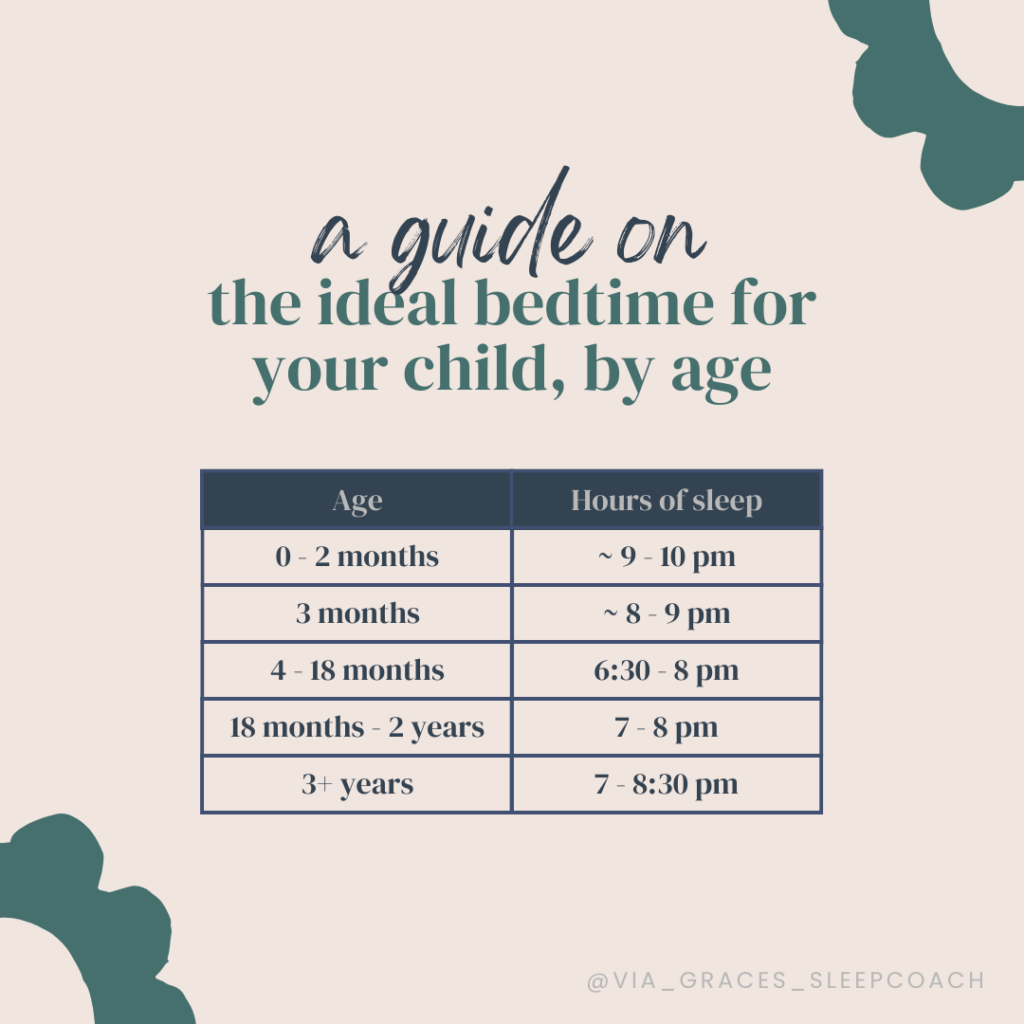Hearing your baby wake up early, your toddler call out for you, or your older child come to your room, all before 6:00 am, is the WORST! If you’re like me, you even cringe if it’s before 7:00 am.
But I’m sure we’ve all been there! Early morning wakings are so frustrating as a parent and they can take time to rectify, but it’s not impossible!
So in this blog post, I will share:
- The five most common reasons babies, toddlers, and older kids wake up so early (we’re talking before 6 a.m.!)
- How to handle those early morning wakings
And more!
The Five Most Common Reasons Babies and Toddlers Wake Up Early
1. Overtiredness
Have you heard the phrase “sleep begets sleep”? It means that better daytime sleep = better nighttime sleep. It sounds counter-intuitive, but when kids don’t get enough sleep, their bodies actually build up a sleep debt that is hard to “pay back.”
Physically, overtiredness sends cortisol and adrenaline running through your child’s system – they need sleep more than anything, but those stress hormones make it so hard to not only fall asleep but to stay asleep, which can cause early morning wake-ups.
So if your child is still taking one or multiple naps during the day, make sure you’re following their appropriate awake windows or set schedule! When it comes to overtiredness, we’re looking at time awake between naps as well as time awake before bed, so it’s the whole picture we’re looking at.
If you’re not sure what schedule is best, check out our free baby schedule guide for more help!
It’s also important to make sure your baby or child is going to bed at an appropriate time each night. Most babies and young kids benefit from a bedtime between 6:30-8:00 pm, and that might get closer to 8:30 if you have an older toddler still napping, or maybe a school-aged child with lower sleep needs.
So if your child is regularly going to bed later, an earlier bedtime may solve those early mornings!

Finally, whether or not your child is still napping, don’t be afraid of an early bedtime to make up for a rough nap day or just an extra sleepy or off day! I have been known to put my girls down around 6 or 6:30 pm when necessary. Some parents fear that an early bedtime will cause an even earlier waking, so they keep pushing bedtime later and later, but that’s where sleep debt starts setting in!
So lean into those early bedtimes, when necessary.
But not only is overtiredness a common reason for early mornings, but so is undertiredness.
2. Undertiredness
Ideally, we want it to take around 5-15 minutes for our little ones to fall asleep. If it’s taking longer, it could be due to overtiredness or undertiredness.
While overtiredness is usually the first thought I have when babies or toddlers regularly wake up before 6 a.m., undertiredness is a close second! If kids don’t spend enough time awake during the day, or between naps, or before bedtime, they could go into the night “undertired.”
That might make it take longer to fall asleep at bedtime, or cause more night wakings due to a lack of sleep pressure.
Or maybe they’re still falling asleep within 15 minutes and even sleep through most of the night, when 5 a.m. comes around and their body is in a naturally lighter stage of sleep anyway, they will likely wake up and wake up fully, ready to go for the day!
They didn’t have enough “sleep pressure” built up the day before to not only fall asleep smoothly but also stay asleep all night long – they’re just not tired enough. So again, making sure you’re following an age-appropriate schedule is key to finding this balance!
3. Wake-Up “Reward”
What does your child do within the first few minutes of waking up? Do they nurse? Get a bottle? Go right to breakfast? Snuggle in bed with you? Watch TV?
Some early morning wakings, especially for toddlers and older kids, are due to children getting one of these exciting “rewards” as soon as they wake up – why would they not keep waking up early, they get screen time right away, or they get to snuggle in bed with mom and nurse as they doze back to sleep for an extra 30 minutes!
I know it’s sometimes survival mode for you to catch some extra sleep with those cuddles, or have some peace and quiet as you’re trying to get ready in the mornings, but try to delay those extra snuggles in your bed, immediate nursing, bottle feeding, or breakfast, and TV for at least 10 minutes after your child wakes up to break that association. We just don’t want any of those activities to be associated with sleep/wake-up time.
Instead, turn the lights on, come out of their room, they can get dressed, help turn on the coffee pot, do a puzzle, say good morning to the birds, or read a book, and then start getting their milk or breakfast.
4. Too Much Light
Our bodies are naturally in a lighter stage of sleep in those early morning hours, so if there is any light peaking through the windows, it could cause your child to wake up early. That’s how our bodies are wired to work! This is much more of an issue in the Spring and Summer months when the sun is rising earlier, but it can be a challenge year-round.
We tell the families we work with that the ideal level of darkness is, “I can’t see my hand in front of my face,” whether it’s 2:00 pm or 2:00 am. If you’re looking for some better blackout solutions, check out my favorites!
5. They do not have independent sleep skills
How does your little one fall asleep at night? Are you able to lay them down, say goodnight, and walk away while they’re still awake? Or do you have to rock them to sleep, feed them to sleep, or lay with them to sleep? Do they need a pacifier?
Anything that your child needs to fall asleep that’s outside of themselves (rocking, pacifier, feeding, or you!) is considered a sleep prop. And when babies and toddlers rely on some sort of sleep prop in order to fall asleep, as they naturally stir throughout the night (like we all do!), rather than simply rolling over and going back to sleep, they usually wake all the more fully, needing that same sleep prop to get back to sleep.
So whether they wake a few times in the night or just around that 5/5:30 a.m. mark, they need help getting back to sleep! And come 5 a.m., all of our bodies are in a naturally lighter stage of sleep. So if they stir at 5/5:30 and have already gotten 9-10 hours of sleep, they are going to be so much more alert and awake, no matter what you do to get them back to sleep. In fact, you could actually be more stimulating to them because they’re ready to go!
Once babies and toddlers learn how to fall asleep independently (that’s the goal of sleep training!), they start to naturally connect those sleep cycles overnight, and can even do so through that early morning hour.
So sometimes the solution to those early mornings is simply sleep training and giving our kiddos the skills to sleep all the way through.
Early morning wakings are TOUGH! And take time to rectify. For more reasons why your baby or toddler might wake up early every day, as well as all of our proven tips to solve those early mornings, check out our guide, How to End Early Morning Wakings.
What to do when your child wakes up before 6 a.m.
When I work with families on correcting these early mornings, we make it a rule that it is not considered morning time until at least 6:00 am, because we don’t want those early mornings to become a pattern. We’re trying to tell your child’s body clock it’s still nighttime.
So if your child wakes up at 5:15 am, treat it just like you would a night waking at 2 am – the expectation is sleep! In a perfect world, your child would fall back asleep and wake up at a more appropriate time (after 6!), but even if they don’t fall back asleep, staying in a dark and quiet room with minimal interaction is teaching their body clock that it’s still time for sleep.
If you are in the midst of sleep training, you’re going to respond using the same method you’re using at bedtime, normal night wakings, and for naps. If you’re working with us, that will be the chair method or leave and check.
If you’ve already sleep trained, it’s honestly ideal to stay out of there as much as possible, to avoid adding extra stimulation or frustration. If it’s necessary to pop in, you’ll ideally do really brief check-ins to reassure your little one, but then leave again. The point here is that we’re trying to tell their little body clocks that it is not time to start the day. And over time, this actually could correct the early mornings.
And if your child is two or older, consider using a toddler clock to help combat these early mornings! Rather than it being nighttime or morning time based on what mom and dad say, it’s based on their clock! So if they wake up and see that their light isn’t on, or that it’s still red, they already know it’s still nighttime.
Just like there are certainly more reasons your little one could be waking up early, there are also more solutions to pushing that wake-up time later. But these are all the biggies! So remember, if you’re looking for an even deeper dive into figuring out those early mornings, make sure you check out the guide to solve early morning wakings
p.s. If your baby or toddler is getting a full night of sleep but they are caught in an early-to-rise and therefore early-to-bed pattern, continue learning more about how to break that cycle in this blog post!
Conclusion
Early morning wakings are so frustrating! Fighting naps, short naps, and waking up early are the toughest parts of the sleep puzzle, but that doesn’t mean it’s impossible to fix! It takes time to adjust, as you’re often competing with your little one’s body clock, but you can get there.
Time and consistency are the biggest keys to solving those early wakings!
Also remember that early morning wakings are hard. And even as a sleep consultant, sometimes it’s really obvious why a kiddo is waking up early, and it’s an “easy” fix. But sometimes it’s not super clear, and it’s not until we have a really set plan and track sleep over time that we’re able to start understanding what’s going on and then course-correcting. Remember that you likely won’t find an overnight solution, but that time and consistency will be your best friends here.
And if you’ve gone through this list and are still stumped by your child’s early mornings, don’t forget to check out our guide to solving early morning wake-ups!
Or if you’d like someone to simply tell you what to do and walk alongside you as you work to solve those early mornings, we’d love to help – check out our personalized sleep packages.
With Grace,
Lauren
Did you find this helpful? I’d love for you to follow me on Pinterest and pin it for later!

